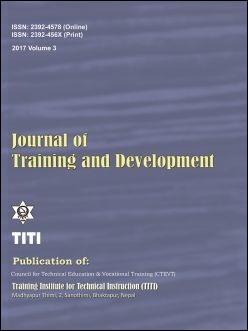An Ethnographic Inquiry on Injecting Drug Users towards Vocational Training
DOI:
https://doi.org/10.3126/jtd.v3i0.18228Keywords:
Injecting drug users, rehabilitation center, vocational education and trainingAbstract
In this study, I pursued to gain an in-depth understanding on vocational education and training (VET) of injecting drug users residing in rehabilitation in Kathmandu valley. Two rehabilitation centers that accommodate institutionalized injecting drug users were purposively selected for the study in which six participants voluntarily participated. An ethnographic narrative enquiry, which is the qualitative research methodology, was employed to gain insight into their lived experiences and perception towards VET. The themes that emerged from the findings were interspersed by focusing on a range of sociological theories. This study brings to the fore that injecting drug user has affirmative impression towards VET and understands the importance of VET but is not willing to study anymore. Participants’ perception understood earning money is more important than getting VET and they understood that it is too late to study and they are not able to study any more due to the use and abuse of drugs and their study habits have been destroyed by the drugs.
Downloads
Downloads
Published
How to Cite
Issue
Section
License
Authors who publish with this journal agree to the following terms:
- Authors retain copyright and grant the journal right of first publication with the work simultaneously licensed under a Creative Commons Attribution License that allows others to share the work with an acknowledgement of the work's authorship and initial publication in this journal.
- Authors are able to enter into separate, additional contractual arrangements for the non-exclusive distribution of the journal's published version of the work (e.g., post it to an institutional repository or publish it in a book), with an acknowledgement of its initial publication in this journal.
- Authors are permitted and encouraged to post their work online (e.g., in institutional repositories or on their website) prior to and during the submission process, as it can lead to productive exchanges, as well as earlier and greater citation of published work (See The Effect of Open Access).




